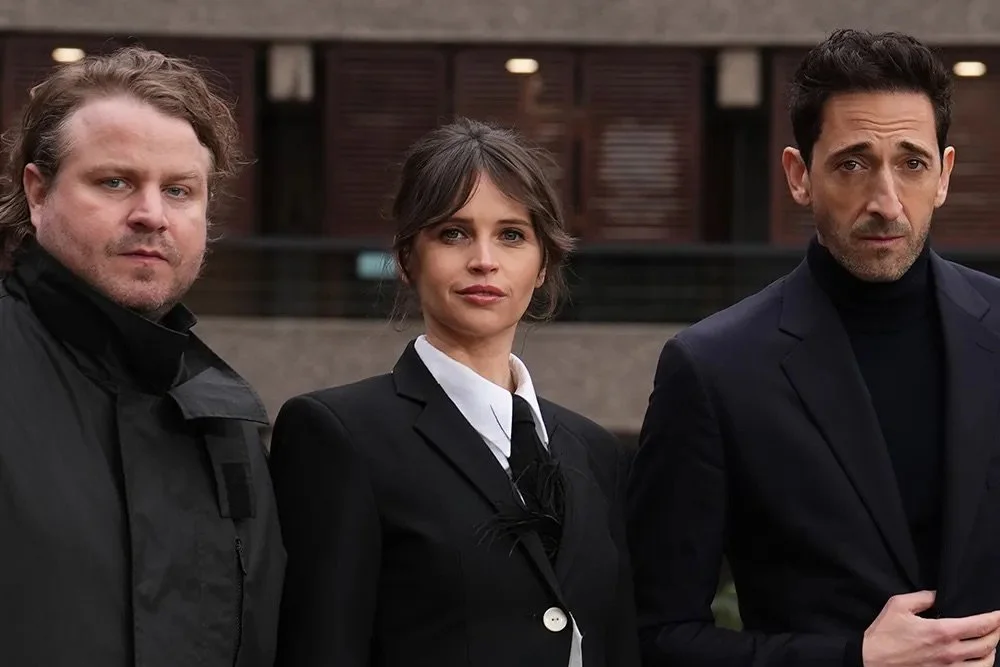Will AI Influence the Oscar Race Amid ‘The Brutalist’ Backlash?
a24
Brady Corbet’s The Brutalist is at the center of a heated discussion about artificial intelligence (AI) in Hollywood. After revelations that Respeecher’s AI technology was used in postproduction to enhance Adrien Brody and Felicity Jones’ Hungarian-language dialogue, the film — a frontrunner this awards season — sparked a debate that extends far beyond its own Oscar prospects. The controversy highlights the growing presence of AI in filmmaking and raises questions about its ethical and creative implications.
The backlash comes as The Brutalist rides a wave of awards success. After securing major Golden Globe wins, including Best Dramatic Motion Picture and Best Director, the film has racked up nine BAFTA nominations and is a strong contender heading into the Oscars. The controversy, however, could shape perceptions as voting unfolds.
Director Brady Corbet was quick to clarify the extent of AI’s involvement. In a statement, he emphasized that Brody and Jones’ performances remain intact and unaltered. “Adrien and Felicity’s performances are completely their own,” Corbet asserted. He explained that Respeecher was used exclusively to refine specific vowels and consonants in Hungarian-language dialogue, ensuring linguistic accuracy without altering the actors’ English-language delivery. Additionally, he noted that production designer Judy Becker avoided AI tools in the creation of the film’s striking visual environments.
Despite Corbet’s assurances, the controversy underscores broader anxieties about AI in Hollywood. Critics worry that increasing reliance on AI could compromise authenticity, diminish the value of human creativity, and even lead to job losses. For actors, whose voices, likenesses, and performances are their livelihoods, the implications are particularly acute.
AI is not new to Hollywood. It has been quietly integrated into various aspects of filmmaking, from visual effects to dialogue editing and dubbing. Respeecher, the Ukrainian company behind the technology used in The Brutalist, has worked on numerous high-profile projects. It’s known for de-aging voices, such as Mark Hamill’s young Luke Skywalker in The Mandalorian and The Book of Boba Fett.
Another AI tool, Flawless, has developed applications for dubbing and dialogue adjustment. Its Deep Editor technology synchronizes lip movements and edits lines of dialogue during postproduction. Recent projects utilizing these tools include Venom: The Last Dance and Kraven the Hunter.
PA Images via Getty Images
While these tools promise efficiency and cost-effectiveness, they also raise ethical questions. Companies like Respeecher and Flawless emphasize consent and collaboration with industry guilds, but as AI becomes more prevalent, clear guidelines will be essential to prevent misuse.
AI’s growing presence in Hollywood is the latest chapter in a long history of technology influencing performances. In Black Swan (2010), Natalie Portman’s Oscar-winning performance was scrutinized when it was revealed her face was digitally placed on a professional ballerina’s body. Similarly, Michael Douglas’ piano playing in Behind the Candelabrawas enhanced with digital effects.
POPULAR ON THE CINEMA GROUP
Performance capture technology has also sparked awards debates, with Andy Serkis’ groundbreaking roles in The Lord of the Rings and Planet of the Apes earning critical acclaim but no Oscar recognition. More recently, James Cameron defended Zoe Saldana’s work in Avatar as equally deserving of awards attention despite the digital enhancements of her performance.
The integration of AI into these processes raises new questions: How much of an actor’s performance must remain untouched for it to qualify as “authentic”? And how do we credit the contributions of actors, visual effects artists, and AI developers in crafting a final performance?
The concerns surrounding AI in filmmaking go beyond artistic integrity. For many, the fear is that AI could erode job opportunities in Hollywood. SAG-AFTRA’s recent negotiations placed a strong emphasis on protecting actors’ voices, likenesses, and performances from being exploited by AI.
Moreover, the use of AI in postproduction processes like dubbing, automated dialogue replacement (ADR), and localization raises complex questions about consent. Tools like Respeecher’s voice conversion technology or Flawless’ True Sync offer powerful capabilities, but they also challenge traditional notions of authorship and ownership in filmmaking.
The controversy around The Brutalist highlights the evolving role of technology in awards consideration. AI has already been used in several Oscar contenders this year, including Furiosa, Here, and Alien: Romulus. These projects relied on AI for tasks like de-aging actors and creating digital likenesses, further blurring the line between performance and postproduction enhancement.
While AI’s involvement in The Brutalist may not disqualify it from awards contention, it adds a layer of complexity to the film’s reception. As the Academy grapples with the implications of AI, it may need to revise its criteria to account for the increasing integration of technology in filmmaking.
The backlash against The Brutalist reflects a broader unease about the role of AI in Hollywood. While tools like Respeecher and Deep Editor offer valuable capabilities, they also challenge traditional notions of creativity, authorship, and performance. As AI becomes more integrated into filmmaking, the industry must navigate ethical considerations and establish clear guidelines to ensure fair and transparent use.
For now, The Brutalist remains at the forefront of the Oscar race, but its AI controversy serves as a reminder of the larger debates shaping the future of Hollywood. Whether AI will ultimately enhance or undermine the industry’s creative foundations remains an open question, but one thing is clear: the conversation is far from over.
THE CINEMA GROUP - YOUR PREMIER SOURCE FOR THE LATEST IN FILM AND ENTERTAINMENT NEWS. FOLLOW US ON SOCIAL MEDIA @THECINEMAGROUP










